The Impact of Cannabis on eSports Performance: Analyzing Reaction Times and Strategic Thinking in Gamers
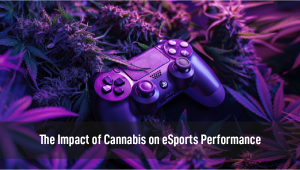
- 1. The effects of cannabis on reaction time and short-term memory: a crucial element in esports
- 2. The impact of cannabis on decision-making and cognitive function: navigating the cognitive terrain of esports
- 3. The effects of cannabis on overall gaming performance: a comprehensive evaluation
- 4. Conclusion: navigating the intersection of cannabis and esports with prudence
In the fiercely competitive realm of eSports, where split-second decisions determine victory or defeat, gamers are perpetually in pursuit of strategies to gain an edge over their adversaries. Recently, cannabis has emerged as a subject of intrigue, with some gamers considering its potential to enhance performance. However, before embarking on this avenue, it is imperative to delve deep into the scientific intricacies surrounding its effects on cognitive functions. This extensive exploration seeks to unravel the multifaceted impact of cannabis on reaction times, decision-making processes, and overall gaming proficiency in eSports.
The Effects of Cannabis on Reaction Time and Short-Term Memory: A Crucial Element in eSports
Reaction time stands as a cornerstone of success in eSports, particularly in genres characterized by rapid gameplay. Cannabis, notably containing Tetrahydrocannabinol (THC), has been identified to potentially impede reaction times. Research elucidates THC's capacity to alter the speed at which gamers process and respond to in-game stimuli. Nonetheless, the nuanced repercussions of cannabis usage underscore the significance of variables such as dosage and strain diversity. While anecdotal reports may suggest heightened focus post-cannabis consumption, empirical substantiation regarding enhanced reaction times remains elusive.
Recent research underscores the importance of understanding the acute effects of cannabis on cognitive functions, notably reaction time, decision-making, and short-term memory. This is particularly pertinent for individuals with daily cannabis use who may have developed tolerance to its effects. However, there remains a gap in understanding how tolerance to cannabis impacts these acute effects. Thus, this study aimed to investigate the influence of cannabis tolerance on reaction time, decision-making (gap acceptance), and short-term memory following acute cannabis use.
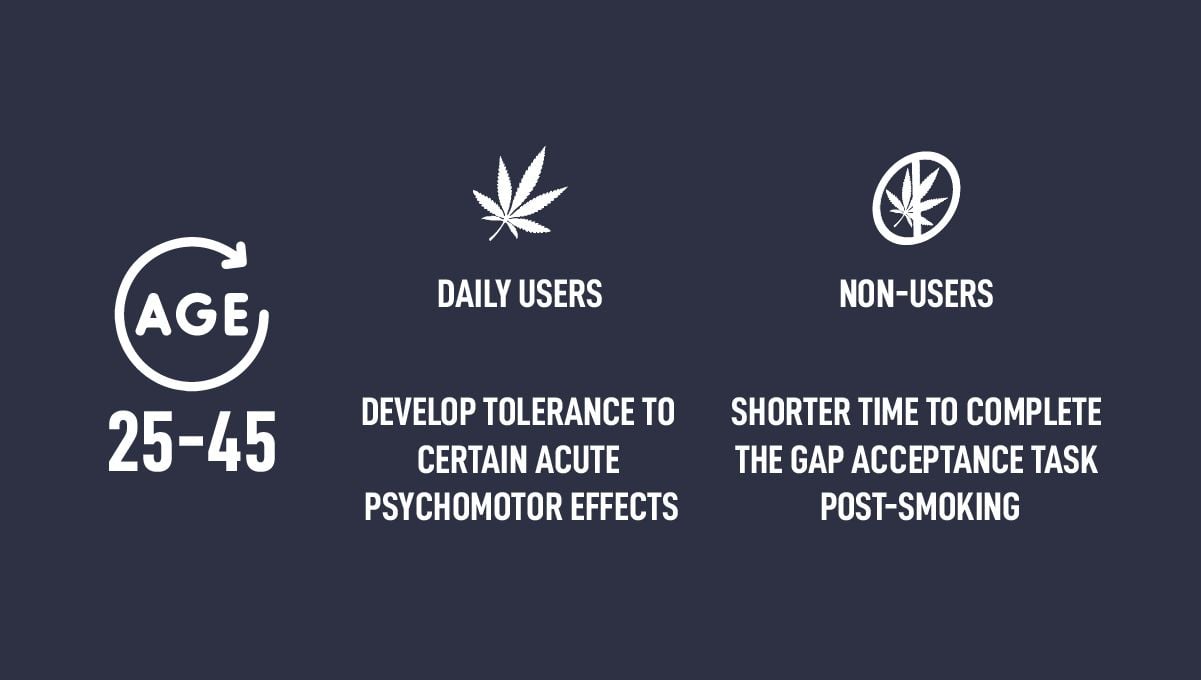
Participants aged 25 to 45 were enlisted, categorized into occasional users, daily users, and non-users. They underwent a series of tests using a tablet-based test battery before and around 60 minutes after smoking cannabis flower. Occasional and daily users self-administered cannabis with a high THC concentration (15–30%) through smoking or vaping.
The findings revealed that occasional users exhibited slowed reaction times and decreased short-term memory post-cannabis use compared to non-users. Additionally, daily users took longer to complete the gap acceptance task post-smoking, although their accuracy remained consistent. These results suggest that daily cannabis users may develop tolerance to certain acute psychomotor effects, such as reaction time, while maintaining accuracy in decision-making tasks. Overall, this study underscores the importance of cognitive and psychomotor assessments in identifying impairment linked to recent cannabis use, especially in individuals with habitual cannabis consumption.

Despite well-documented evidence of cannabis's detrimental effects on cognition in adolescents and younger adults, limited research has explored its impact on cognitive function in older age groups. Another study aimed to investigate the correlation between lifetime cannabis use patterns and subjective cognitive performance in adults aged 60 and above in the United States.
The study encompassed a sample of 51 participants who reported cannabis use within the past year. They completed online questionnaires covering demographics, mental health assessments, and subjective cognitive function evaluations. The participants' average age was 68.06 years (SD = 5.80), with 49% being women. Regarding education, they averaged 15.39 years (SD = 2.21), and the majority identified as White (90.2%), followed by Latinx or Hispanic (5.9%), Black or African American (2%), and Other (1%).
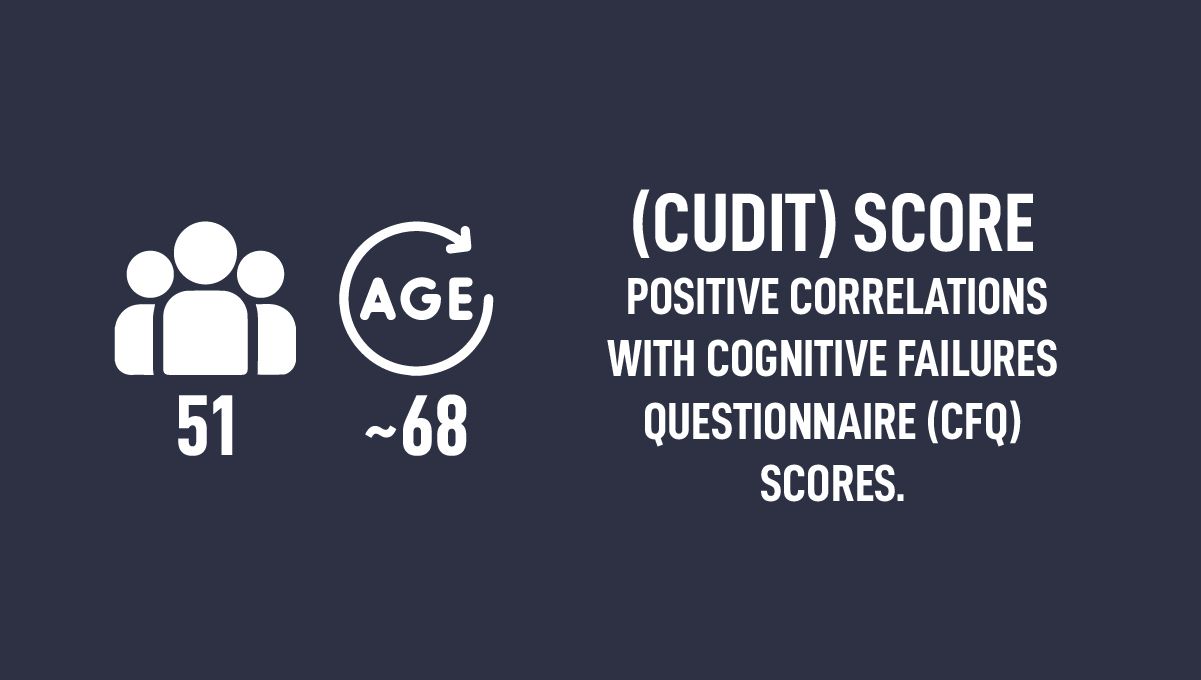
Among the participants, 59% reported initiating cannabis use during childhood or adolescence (ages 7-17), while 31% started during adulthood (ages 18-58), and only 8% began in older adulthood (ages 62-84). On average, the sample reported using cannabis for 19.75 days (SD = 11.14) in the last month, with 69% having used cannabis for 20 or more years. The total Cannabis Use Disorder Identification Test (CUDIT) score showed significant positive correlations with Cognitive Failures Questionnaire (CFQ) scores.
Interestingly, neither the number of days of use in the past month nor the total years of use showed significant associations with subjective cognitive function. These findings underscore the importance of assessing symptoms of Cannabis Use Disorder (CUD) when addressing cognitive complaints in older adult cannabis users, rather than focusing solely on usage frequency. Further research is warranted to investigate objective measures of cognitive functioning in this demographic.
The Impact of Cannabis on Decision-Making and Cognitive Function: Navigating the Cognitive Terrain of eSports
Effective decision-making lies at the crux of eSports triumph, necessitating astute judgment amidst the dynamic landscape of virtual battlegrounds. Herein lies the conundrum surrounding cannabis usage. THC, with its propensity to modulate cognitive functions, presents a formidable challenge to gamers' strategic acumen. Studies intimate that cannabis usage may compromise faculties vital for prudent decision-making, potentially culminating in impulsive actions or oversight of critical nuances within gameplay. Thus, the integration of cannabis into eSports demands a nuanced consideration of its implications on cognitive integrity.
Another study aimed to investigate memory deficits among young cannabis consumers in Tunisia. Conducted over two months, involving 137 participants aged 18 to 35, the research was conducted among emergency patients at Mahdia Hospital who self-reported cannabis use. Data collection encompassed demographic details, lifestyle, psychiatric history, and cannabis usage patterns. The Functional Impact Assessment scale was utilized to evaluate working memory.
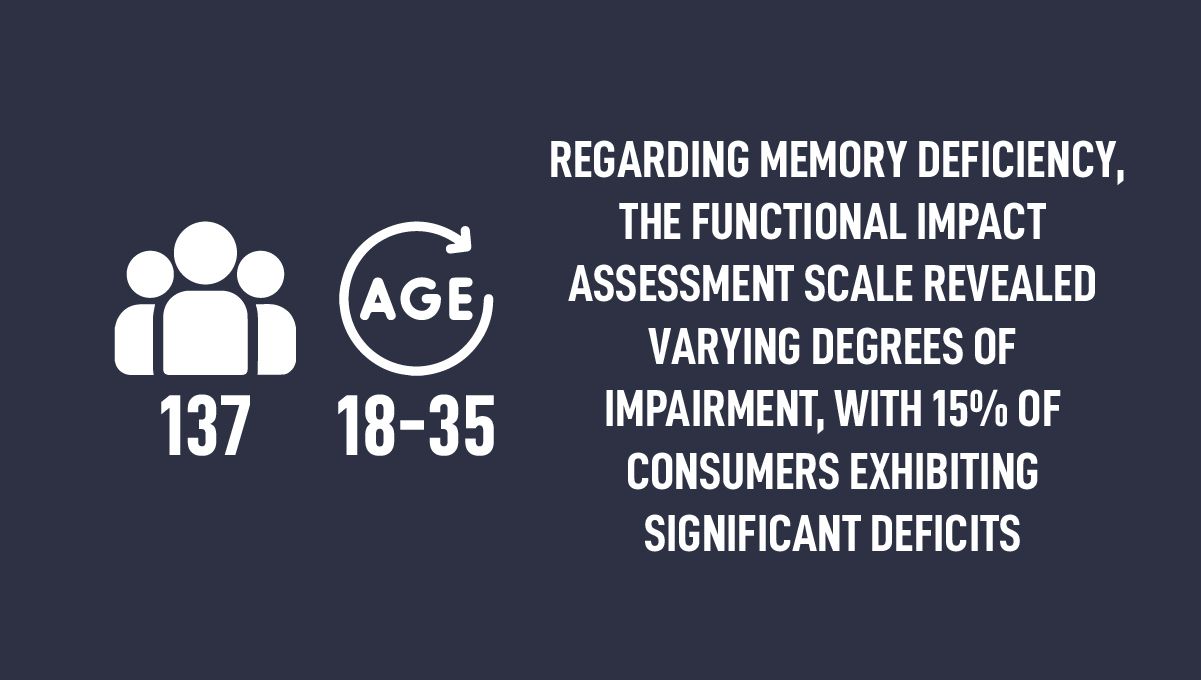
Results indicated a predominantly male sample (71%) with ages ranging from 18 to 35. Notably, 65.9% were single, and 29.7% had experienced academic setbacks. A significant proportion (23.2%) had a psychiatric history. Cannabis usage typically commenced between ages 18 and 25 (70% of cases), often accompanied by other substance use, including alcohol (72.5%), tobacco (74.6%), ecstasy (41.3%), and cocaine (25.4%). Reasons for cannabis use varied, with 66.7% indulging for leisure, 26.8% for anxiety relief, and 23.9% for sedation. Regarding memory deficiency, the Functional Impact Assessment scale revealed varying degrees of impairment, with 15% of consumers exhibiting significant deficits (moderate to extreme). This study underscores the need for further investigation into the contentious relationship between cannabis use and cognitive impairments.
The Effects of Cannabis on Overall Gaming Performance: A Comprehensive Evaluation
The amalgamation of altered reaction times and compromised decision-making invariably precipitates a seismic shift in overall gaming proficiency. While anecdotal attestations may extol the virtues of cannabis in augmenting gaming prowess, empirical validation remains elusive.

Conversely, Cannabidiol (CBD), heralded for its anxiolytic properties, holds promise in alleviating performance anxiety and fostering focus during intense gaming sessions. However, there’s not enough evidence to support if cannabis (either THC, CBD or any other cannabinoid) could improve gaming performance or have the opposite effect.
Conclusion: Navigating the Intersection of Cannabis and eSports with Prudence
The interplay between cannabis and eSports performance is imbued with complexity, mandating a judicious examination of its ramifications. While anecdotal endorsements may laud cannabis as a panacea for gaming excellence, empirical substantiation remains elusive.

Prior to embracing cannabis as a performance enhancer, gamers must meticulously evaluate its impact on reaction times, decision-making processes, and overall proficiency. By fostering an understanding of the risks and benefits, gamers can navigate the intersection of cannabis and eSports with informed discernment.
External Resources
2. Cannabis and cognitive deficiency: a descriptive study
3. 15 Associations Among Subjective Cognitive Function and Cannabis Use in Older Adults
4. Effects of Acute and Chronic Cannabis/Cannabinoids on Cognitive Function Across the Lifespan
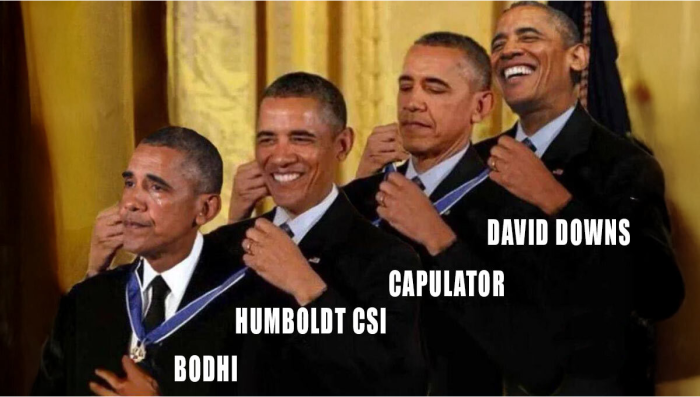











Comments